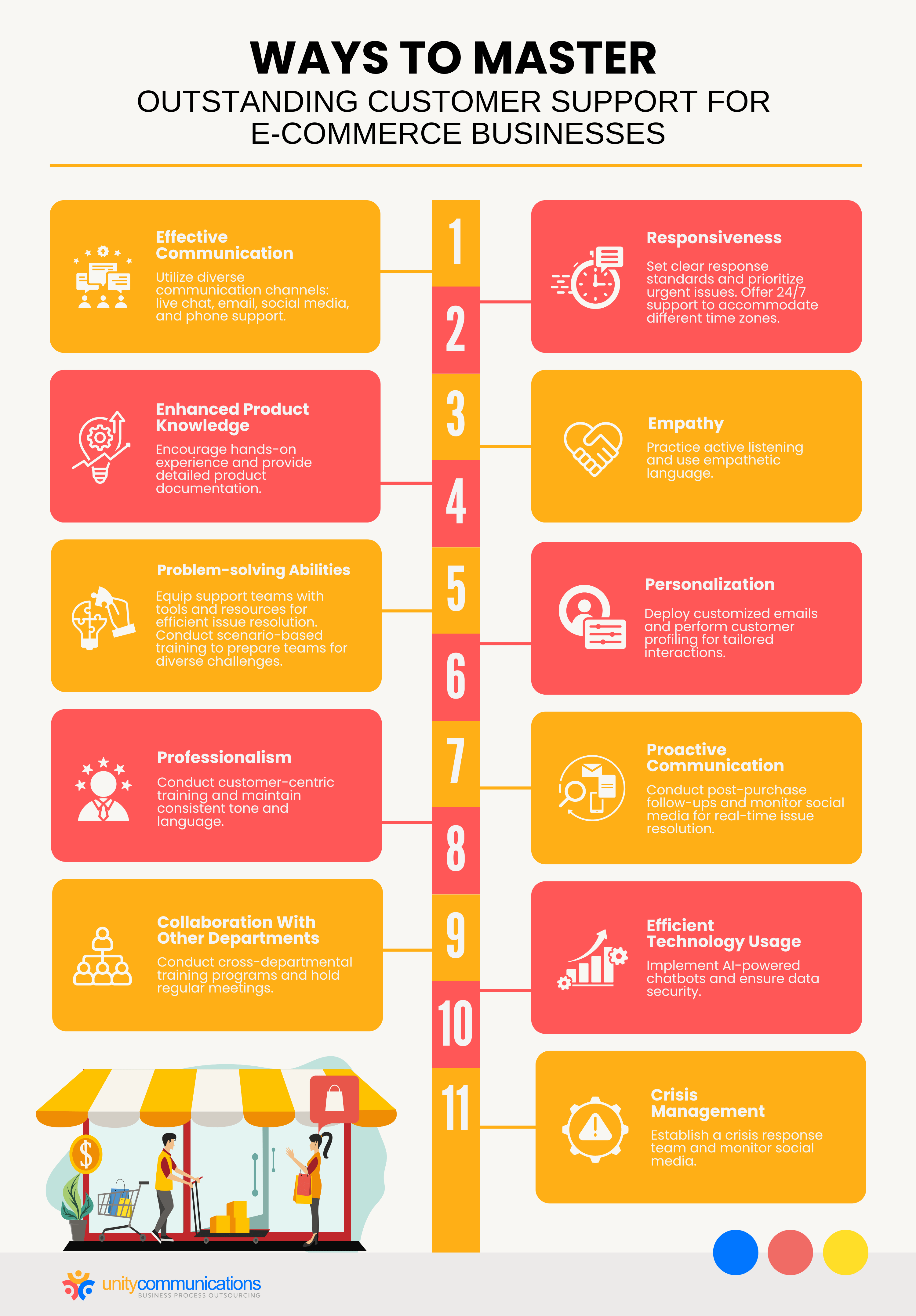Table of Contents
A robust, dynamic, and efficient customer support system constantly provides e-commerce businesses with a seamless and positive buyer experience.
The call center in e-commerce is essential in connecting online stores with consumers of all types. It transcends traditional customer service and incorporates diverse channels, including live chat, email, and social media, for holistic and flexible support.
This article discusses the benefits of exceptional customer support. It also explains the skills and strategies required to master excellent customer service.
Continue reading to learn how to outsource e-commerce customer service.
The Benefits of Exceptional Customer Support in E-commerce
Before anything else, what is e-commerce customer service? This is when call or contact center professionals assist clients while shopping. They promptly address inquiries and manage concerns to deliver exceptional customer support for online buyers or end users.
Excellent customer support is a cornerstone of e-commerce success, increasing customer satisfaction and resolving urgent consumer difficulties. Below are its primary advantages:
- Strengthened customer loyalty and retention. Shoppers experiencing exceptional customer service are more confident in their purchasing decisions. Reliable, prompt assistance fosters return purchases, contributing to long-term customer retention.
- Positive brand reputation. Being known for excellent customer service improves the brand’s image. Satisfied consumers are more likely to share their great experiences with others via word of mouth, online reviews, and social media, bolstering the company’s trustworthiness and attracting new consumers.
- Increased customer lifetime value (CLV). E-commerce enterprises can boost their CLV by delivering exceptional service. Happy consumers are more likely to make repeat purchases and spend more over their lifetime as loyal consumers.
- Honed competitive edge. Exceptional customer support becomes a key differentiator in a competitive e-commerce market. Compared to competitors with similar products and prices, the quality of customer service sets a business apart and influences consumer choices.
- Valuable customer feedback. Engaging with customers through support channels provides crucial insights. Comments on products, services, and customer experiences can be used to refine strategies and identify areas for innovation.
- Long-term cost savings. Investing in exceptional customer support may be costly initially but results in long-term savings. Satisfied customers reduce returns and issue escalations, minimizing customer service expenses.
How to Master Outstanding Customer Support for E-commerce Businesses
The following is a list of critical skills and techniques for exceptional e-commerce customer support. Integrate them into the customer service processes to ensure a positive and seamless buyer experience.
Implement Effective Communication
Effective communication is critical to providing outstanding customer support for e-commerce. It makes consumers feel appreciated and accelerates resolution. Clear and timely interaction creates loyal customers, favorable feedback, and a great brand image.
Here are some tips to master the art of effective communication:
- Use diverse communication channels. To cater to varied customer preferences, utilize live chat, email, social media, and phone support.
- Foster constant engagement. Keep customers informed about order status and potential delays to enhance transparency and satisfaction.
- Include chatbots. Integrate this intelligent technology for handling routine questions, freeing up customer service representatives (CSRs) for more complex issues.
- Introduce a frequently asked questions (FAQs) page. Develop a robust FAQ section to empower customers with self-service options and reduce support inquiries.
- Utilize customer relationship management (CRM). Leverage this system to quickly access customer information and personalize conversations.
Check out the advantages of effective communication:
- More substantial trust-building. The business establishes trust through transparent and clear communication.
- Quick issue resolution. Swift communication expedites problem-solving, enhancing customer satisfaction.
- Positive feedback loop. Effective communication leads to positive reviews and testimonials for a continuous cycle of customer advocacy.
Ensure Responsiveness
Prompt response assists in providing excellent customer support for e-commerce, fostering trust, meeting consumer expectations, and reducing problems. It showcases a brand’s dedication to customer satisfaction.
Follow these tips to master the art of timely responses:
- Utilize automation. Implement automated responses to assure customers that their concerns are acknowledged.
- Set response standards. Establish clear time frames for responding to customer inquiries to manage expectations.
- Prioritize urgent issues. Identify and prioritize pressing issues, ensuring timely attention to critical matters.
- Be available 24/7. Consider offering round-the-clock support to accommodate customers in different time zones.
- Monitor response metrics. Regularly analyze quantitative measures of customer responses to identify bottlenecks and optimize workflows for faster interactions.
- Train for efficiency. Train support teams to improve communication and issue resolution techniques to streamline responses.
Consider the advantages of responsiveness:
- Lower escalation incidences. Swift responses deescalate potential problems, preventing aggravation.
- Reduce customer frustration. Rapid assistance minimizes customer annoyance and dissatisfaction.
- Exhibit customer commitment. Timely responses showcase a commitment to customer needs and concerns.
Demonstrate Empathy
Understanding customer sentiments aids in achieving exceptional customer support for e-commerce establishments. Being empathetic toward customers’ needs helps develop rapport and gain trust.
Follow these tips to master empathetic communication:
- Offer solutions, not just apologies. Go beyond apologies by providing actionable solutions to customer problems. This proactive approach demonstrates a commitment to resolving issues promptly.
- Practice active listening. Engage in active listening to fully understand customer concerns. Repeat and validate their issues to show you are attuned to their needs.
- Use empathetic language. Use compassionate language to convey understanding and concern. Phrases such as “I understand” or “I’m here to help” show empathy and support.
- Put yourself in their shoes. Encourage support teams to envision themselves in the customer’s position, fostering a deeper understanding of their perspective.
Explore the perks of empathetic communication:
- Effective conflict resolution. Empathy means addressing customer issues compassionately and minimizing negative interactions and potential escalations.
- Decreased negative reviews. Empathetic responses can prevent unfavorable feedback. When customers feel their concerns are heard and addressed, they are less likely to express dissatisfaction publicly.
Enhance Product Knowledge
Continuously building product expertise contributes significantly to improving customer support in e-commerce stores. In-depth knowledge enables CSRs to give correct information, assist buyers effectively, and develop trust.
Adhere to these tips to enhance product knowledge:
- Provide product updates regularly. Keep support teams informed about new product launches and updates. Regular briefings strengthen their understanding and expertise.
- Utilize product demonstrations. Provide product or service presentations and tutorials, enabling support teams to better assist customers.
- Encourage hands-on experience. Allow support teams to interact with products directly. This fosters a deeper understanding of functionalities and usage.
- Give product documentation. Develop comprehensive product documentation that CSRs can reference. Clear and detailed documentation aids in quick issue resolution.
Discover the upsides of enhanced product knowledge:
- Accurate and informed assistance. Enhanced product knowledge ensures support teams can provide precise and knowledgeable service, resolving customer questions accurately and efficiently.
- High confidence in customer interactions. A thorough understanding of products instills confidence in support teams, enabling them to handle customer interactions with assurance and authority.
Sharpen Problem-solving Abilities
Improving the problem-solving skills of customer support agents is indispensable for e-commerce businesses. It allows for the speedy and effective resolution of consumer complaints, increasing satisfaction and loyalty.
Observe these tips to sharpen problem-solving abilities:
- Provide tools and resources. Equip support teams with practical tools and resources, ensuring they have the necessary support to tackle various issues efficiently.
- Introduce mentorship programs. Experienced team members guide newer staff in honing their problem-solving skills through hands-on experiences.
- Conduct root-cause analysis training. Train teams in this technique to identify and address underlying issues, which will allow them to prevent recurring problems.
- Offer scenario-based training. Conduct exercises that simulate real customer issues, preparing support teams for diverse problem-solving challenges.
Uncover the perks of sharpened problem-solving abilities:
- Innovative solutions. Training CSR’s problem-solving skills encourages creativity. They can devise fresh solutions to complex issues, improving overall service quality.
- Proactive issue prevention. Teams with keen problem-solving skills can preemptively identify and address potential issues before they escalate, preventing future challenges.
Promote Personalization
Tailoring interactions and recommendations to individual preferences improves customer support for e-commerce enterprises. It fosters customer loyalty, enabling long-term success in the online marketplace.
Follow these tips to promote personalization:
- Develop preference centers. This is where customers can customize their communication choices, allowing for a more personalized experience.
- Offer personalized loyalty programs. Tailor loyalty initiatives to offer rewards and incentives aligned with individual customer preferences and buying patterns.
- Deploy customized emails. Design personalized email campaigns, addressing customers by name and suggesting products based on their buying history.
- Perform customer profiling. Generate detailed customer profiles to understand preferences, purchase history, and behavior, facilitating personalized interactions.
Look at the perks of personalized customer interactions and recommendations:
- Higher conversion rates. Personalized recommendations prompt customers to explore and purchase items that align with their preferences.
- Improved cross-selling and upselling. Personalization facilitates more selling opportunities by introducing customers to complementary products or upgrades based on their unique needs.
- Reduced cart abandonment. Tailored interactions and recommendations address customer needs more effectively, decreasing the likelihood of unfinished online transactions.
Prioritize Proactive Communication
Anticipating client demands, delivering timely information, and addressing possible issues improve buyer happiness and ensure exceptional customer support for e-commerce companies.
Heed these tips to prioritize proactive communication:
- Leverage data analytics. Utilize the technology for predictive analysis to anticipate customer needs and proactively address potential issues before they arise.
- Perform post-purchase follow-ups. Conduct after-sales inquiries to ensure customer satisfaction and address concerns, displaying a commitment to support beyond the transaction.
- Monitor social media. Track real-time social media channels to promptly identify and resolve customer issues, demonstrating a proactive approach to community engagement.
- Develop dynamic FAQ sections. Maintain active and evolving FAQ sections that address customer questions, reducing the need for direct consumer inquiries.
Check out the benefits of proactive communication:
- Improved customer perception. Buyers perceive brands with proactive communication as responsive and caring, positively influencing their impression of the company.
- Efficient resource utilization. Proactive communication streamlines support processes, reducing CSRs’ workload and optimizing resource usage.
Maintain Professionalism
Developing and sustaining professional standards strengthens trust and brand image by establishing a sense of confidence, dependability, and credibility during customer support interactions. E-commerce companies can apply these tips to maintain professionalism:
- Conduct customer-centric training. Implement training programs emphasizing customer-centric and professional practices. This helps ensure support teams prioritize customer needs and satisfaction.
- Establish consistent tone and language. Maintain a consistent style and language across all customer interactions, reinforcing a professional and cohesive brand image.
- Adhere to policies. Train support teams to regularly follow organizational guidelines. This approach ensures a professional and standardized approach to customer interactions.
- Emphasize professionalism in written communication. Stress the importance of being ethical in written correspondence, including emails, chat messages, and social media responses, to convey competence and reliability.
Consider the advantages of professional customer support:
- Strengthened relationships. Professionalism fosters positive relationships between the brand and its customers for sustained growth in the e-commerce industry.
- Consistent service quality. Professionalism sets a standard for reliable service, ensuring every customer interaction reflects the brand’s commitment to excellence.
Operate Omnichannel Support
Omnichannel support ensures seamless interactions across platforms, enhancing accessibility and providing high-quality customer support for e-commerce firms.
Use these tips to master the art of operating omnichannel support:
- Unify customer profiles. Integrate customer profiles for a seamless, unified experience, enabling support teams to access information efficiently.
- Centralize communication platforms. Connect various channels to ensure consistent and synchronized customer-agent interactions.
- Integrate cross-channel communication. Implement systems that enable customers to transition between channels without losing context for a more fluid experience.
- Synchronize real-time data. Ensure instantaneous updating of customer data across platforms, allowing support teams to access the latest information for effective issue resolution.
- Deploy multichannel ticketing systems. Implement ticketing networks to centralize customer inquiries across channels. This allows you to simplify support processes and prevent information silos.
Delve into the benefits of omnichannel support.
- Holistic customer insights. Businesses gain comprehensive customer insights by consolidating data from various channels and improving their understanding of customer behavior, preferences, and trends.
- Optimized customer engagement. Omnichannel support optimizes customer engagement, allowing businesses to connect with customers on their preferred platforms and tailor interactions accordingly.
Focus on Continuous Improvement
Constant improvement keeps pace with changing consumer requirements, raises service quality, and encourages innovation.
Harness these tips to help master the art of continuous improvement:
- Analyze performance metrics. Regularly assess performance measurements to identify strengths, weaknesses, and areas for improvement in customer service.
- Upgrade technology. Keep up with tech advancements. Implement modern tools or systems to boost efficiency and customer support experience for your e-commerce business.
- Benchmark against competitors. Compare customer support practices against industry peers and rivals while adopting best practices and learning from successful models.
- Map customer journey. Chart the customer experience path to identify pain points, allowing for targeted improvements that enhance satisfaction.
- Encourage employee feedback. Promote team input on processes, tools, and workflow, cultivating an internal culture of progress.
Below are the merits of continuous improvement:
- Adaptable to market trends. Customer support can adapt swiftly by staying abreast of market developments and offering solutions aligned with industry trends.
- Boosted efficiency and productivity. Regular improvements optimize workflows, enhancing output and performance in customer support.
Emphasize Customer Education
Instructing and preparing customers with relevant and easy-to-understand information lets them develop self-sufficiency, contributing to remarkable customer support for e-commerce companies.
Employ the following tips to emphasize customer education:
- Host regular webinars or workshops. Educate customers on product features, updates, and best practices, fostering engagement and understanding.
- Provide infographics and visual aids. Use these resources to simplify complex information so customers can grasp critical concepts and functionalities.
- Introduce interactive tutorials. These video guides walk customers through intricate processes for clarity and promote self-learning.
- Personalize learning paths. Tailor educational content to align with individual needs and interests.
- Craft detailed FAQs. Enhance this section with thorough explanations, offering customers a quick reference for common issues and solutions.
Learn about the favorable effects of customer education:
- Reduced support inquiries. Prioritizing customer education reduces repetitive questions, thus empowering customers to find answers independently and easing CSRs’ workload.
- Increased customer loyalty. Well-informed customers are more likely to stay dedicated, appreciating the brand’s commitment to their understanding and success in using the product.
Collaborate With Other Departments
Effective collaboration between different units is essential for achieving customer satisfaction. This can be achieved through open and seamless communication and ensuring everyone works toward the same cross-functional objectives.
Adopt these tips to enhance the customer support team’s collaboration with other departments in the e-commerce company:
- Conduct cross-departmental training programs. Implement cross-departmental training initiatives for a shared understanding of products, policies, and customer interactions.
- Hold regular cross-functional meetings. Schedule conferences involving representatives from various departments to discuss challenges, share insights, and align strategies.
- Consolidate customer data platforms. Merge all customer information to ensure they are seamlessly shared and updated across departments.
- Integrate project management tools. This procedure allows teams to collaborate seamlessly on shared projects.
- Encourage open feedback channels. Promote a relaxed environment among departments, facilitating continuous improvement based on shared insights.
See the positive outcomes of cross-departmental collaboration:
- Shared responsibility for success. Departments collaborating on customer support share responsibility for success, fostering a sense of collective ownership and dedication to achieving exceptional outcomes.
- Enhanced employee morale. Collaboration boosts confidence, creating a positive work environment as team members unite to improve customer satisfaction.
Use Technology Efficiently
Utilizing technology to its full potential improves consumer experiences by streamlining processes and allowing for faster issue response.
Execute these tips to use customer support tools efficiently for your e-commerce business:
- Implement chatbots with artificial intelligence (AI). Integrate AI-powered chatbots for instant responses and efficient customer interactions, freeing human agents for more complex issue resolution.
- Secure data via encryption. Employ robust encryption measures to protect customer information. Doing so strengthens trust and compliance with privacy regulations.
- Utilize voice recognition technology. Explore this technology for customer interactions, offering a convenient and personalized support experience.
- Optimize mobile support. Ensure support systems are designed for mobile devices to accommodate customers accessing services through smartphones and tablets.
- Incorporate live chat functionality. Integrate this feature for real-time assistance, providing customers with immediate support during purchases.
Experience the benefits of efficient technology.
- Scalable solutions. Efficient technology supports business growth by providing flexible processes that adapt to increasing customer demands.
- Improved productivity. Automation and streamlined operations enhance team output, enabling support agents to handle more challenging issues and high-value interactions.
Manage Crisis Effectively
Effective crisis management indicates a prepared and responsive reaction to unexpected obstacles, preserving consumer trust and retaining dependable customer support for e-commerce stores.
Perform these tips to manage a crisis effectively:
- Establish a crisis response team. Formulate a dedicated team with predefined responsibilities for a swift and coordinated approach during challenging situations.
- Monitor social media and online platforms. Tracking tools are used to create real-time awareness of customer sentiments on social media, enabling immediate response.
- Collaborate with public relations (PR) and legal teams. Work closely with PR and legal professionals to align communication strategies and ensure compliance with regulatory requirements.
- Implement customer support hotline and channels. These channels are for crisis-related inquiries, providing a responsive avenue for customer concerns.
Understand the positive impact of effective crisis management:
- Protected brand reputation. Swift and decisive actions during a crisis safeguard the brand’s reputation, preventing long-term damage and maintaining a positive image in customers’ eyes.
- Sustained customer loyalty. Proactive crisis management minimizes negative impacts on customer experiences, contributing to customer retention even in challenging situations.
Outsource to Enable Superior Customer Support for E-commerce Companies
Partnering with a business process outsourcing (BPO) company to manage customer service operations can help e-commerce enterprises consistently provide excellent customer satisfaction and experience.
Numerous BPO companies provide affordable call center services, high-quality consumer assistance, effective communication, and specialized solutions to organizations looking for dependable solutions to their needs.
They offer various services, including outbound and inbound call centers for e-commerce enterprises. These services improve customer relationships, raise revenue, and deliver an unparalleled buyer experience.
Take these steps to help identify the best call center for e-commerce businesses:
- Review customer service outsourcing strategies. Determine the number of third-party CSRs, communication channels, and the type of BPO most suited to the business objectives and projected achievements.
- Evaluate candidates to find a BPO partner. Select partners based on set criteria, including staff, talent, successes, and background. Opt for those with dedicated personnel for outsourced projects.
- Inquire about each prospect’s total costs, fees, and BPO billing. The prospect’s performance history and company requirements determine the cost of e-commerce call center services.
- Reduce the number of applicants and collect crucial details. To each short-listed candidate, submit a request for proposal (RFP) stating the work scope, time frame, budget, and needed solutions for the given responsibilities.
- Select the third-party vendor that offers the most significant value. Establish a service-level agreement (SLA) with the BPO partner. The SLA provides the expected services and critical needs, such as key performance indicators (KPIs).
- Keep tabs on outsourced work. Determine if the business relationship achieves all of the time-bound goals. Maintain constant contact with the BPO partner to maximize the likelihood of profitable outsourcing.
The Bottom Line
Exceptional online customer support offers a myriad of benefits. Mastering customer support for e-commerce involves honing essential skills and strategies. Adoption ensures a seamless, personalized, and professional customer experience, fostering loyalty and growth in the competitive e-commerce sector.
Assigning e-commerce customer service functions to a BPO company can help elevate processes. The service provider can simplify and enhance operations by offering affordable solutions and applying best practices to deliver first-class customer service. Maximize your outsourcing strategy by taking the steps outlined above.
Let’s connect to learn more about exceptional customer support for e-commerce companies!







